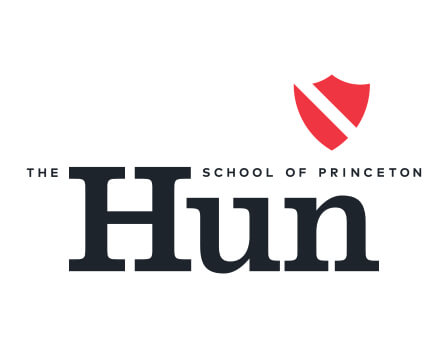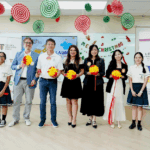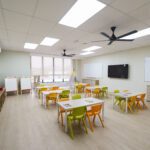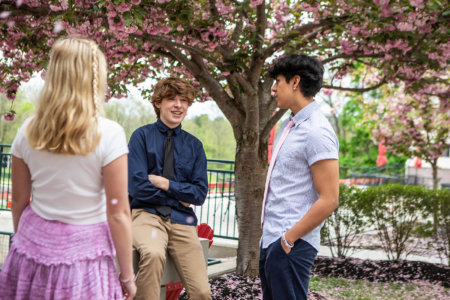Moving away from home for school can stir a mix of excitement and fear. Yes, it’s natural to feel nervous, but there’s often no reason to be – especially when you have an entire community cheering you on every step of the way.
That’s the kind of environment students get at The Hun School of Princeton. The school is home to students in grades 6 through PG, but the boarding program begins in grade 9.
Founded in 1914 by Dr. John Gale Hun, what began as a tutoring centre is now a success story of the power of using individualized attention to unlock students’ potential. Today, this philosophy remains central to a Hun education. Teachers here instruct, guide, and mentor. Some are even working with psychology professor and author David Yeager on his newest book about mentorship.
Dr. Yeager’s approach, called the “mentor mindset” calls for faculty to set high expectations for their students, and to offer high levels of support for them. This helps foster thoughtful and empathetic interactions with students, which can build understanding and trust in the classroom.
“The greatest strength of The Hun School has always been a faculty that knows and cares for students as individuals,” says Ryan Hews, Upper School head. “As we continuously strive to deepen those connections, Dr. Yeager’s work is invaluable to us in fostering a growth mindset in students through trusted mentors who help build resilience and skill.”
Just ask graduate Pedro Poli, ‘24. “I can’t believe how much I’ve learned here in just two years,” he shares. “Not just in the classroom, but from dorm parents, roommates, teachers, and friends.”

Hun School makes sure students can balance their studies with time for clubs and activities. Source: Hun School of Princeton
Living with mentors who care 24/7
Hun’s boarding experience is where students can find both support and a window into the world. “A dorm parent taught me Latin, my roommate from Bahrain shared his culture, and my friend from Russia taught me a few words in his language,” says Poli.
Despite its global outlook, Hun’s boarding community feels like home. The small size and intentionally-designed community events provide students with a sense of belonging that helps them to feel right at home. And that comfortability lends itself to encouraging students to excel in a vigorous academic environment.
Resident life staff and dorm parents take their role as in loco parentis seriously; for example, Mr. Connor Brennan, a dorm parent and History teacher, helps students stay focused and offers support when needed.
“Whether it’s dinner or study hall, I like being the go-to dorm parent when on duty. During study hall, it’s nice to just check in with the kids on a regular basis. I usually post myself up in the second-floor lounge after I do the checks in the rooms. If they want, they can come and talk to me, and I think that’s a comforting thing. Hopefully, they feel like they can trust me and get some good advice on whatever they’re asking about,” Mr. Brennan says.
Various evening and weekend programmes, from casual conversations about current events to structured leadership, wellness, and diversity activities, are mainstays of boarding here. Whatever form and venue they take, all of this is geared to empowering Hun boarders to live their best lives.

What makes the Hun learning experience special is its mix of challenging academics and a happy, supportive atmosphere. Source: Hun School of Princeton
Preparing you for life beyond Hun
One of the many benefits of Hun’s personalised mentorship is its ability to spur students to excel academically. Central to this is Hun’s tradition of “Extra Help,” a dedicated block of time set aside each day before and after school for students to meet with teachers one-on-one. Students might use this time to work on coursework, improve projects, or ask any follow-up questions to the day’s lesson.
A student-favourite is Ms. Dara Martin, mentor extraordinaire, English teacher, dorm parent, global and immersion learning programme director, and next term co-director. To her, mentoring means offering comfort after a difficult day, creating a space where students feel heard, and helping them succeed with their college essays. She’s known for starting early and staying late, ensuring every student gets what they need from her.
“She makes me want to be the best version of myself,” shares Sydney R. ‘25, who affectionately refers to Ms. Martin as her “school mom”. “She challenges me to think intentionally about my actions, she makes it clear she’s always in my corner, and even on her busiest day, she will never close her office door or ask us to leave so she can finish her work. I can’t even fathom what my Hun experience would look like without Ms. Martin,” she says.
Advisory is another key part of life at Hun, giving students a reliable support system throughout their time at the school. Every student is assigned an advisor when they enter the school and meet with their advisory group often throughout the week. Advisories remain together until graduation, allowing for the groups to create and maintain the close personal relationships that are a hallmark of a Hun School education.
“Wellness at Hun is a community responsibility and everyone has a role to play in that. Advisors are our student’s first line of support on campus and are designed to serve as the liaison between the student and every other facet of their experience at Hun,” says Eva Ostrowsky, Director of Counselling and Wellness.
“Each year, when we begin the process of pairing new students with advisors, our grade level deans are incredibly intentional about determining what each student needs most from an advisor — whether that be an advisor who is a community builder; a strong organisational and academic coach; someone who potentially shares an identity, affinity, or passion.”
With so many rooting for them, there’s only onwards and upwards for Hun students. They grow academically and personally – radiating resilience, curiosity, and joy. Using these crucial soft skills, alumni have gone on to become entrepreneurs and innovators to make a meaningful impact on the world.
Follow The Hun School of Princeton on Facebook, Instagram, YouTube and Flickr.













